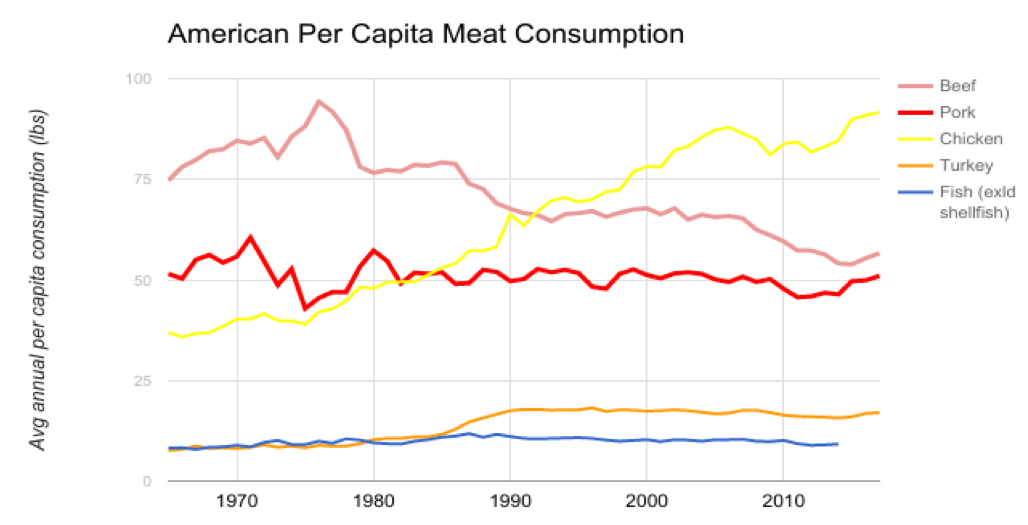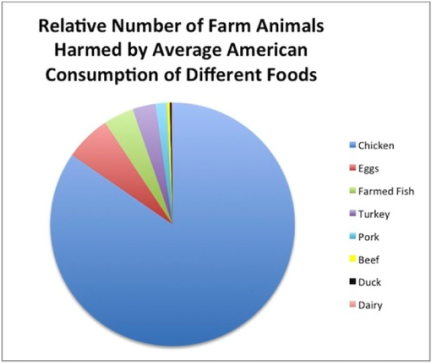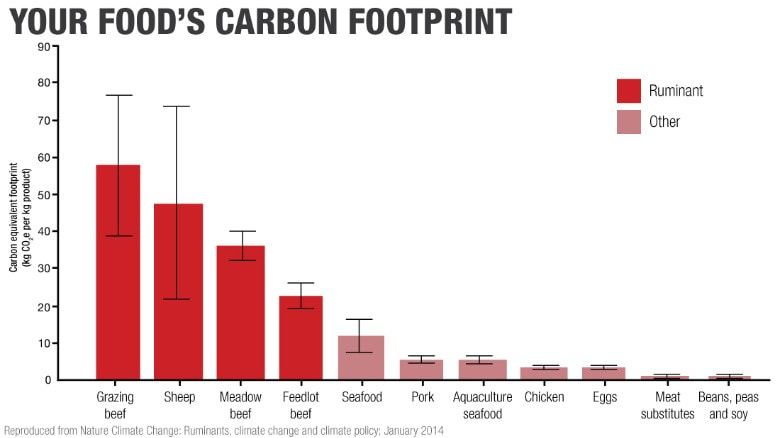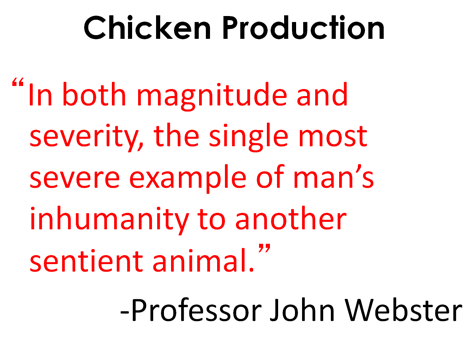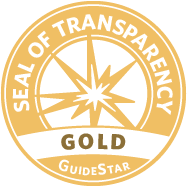|
This year, the average person will eat more animals than ever before. It is time to consider the facts in our advocacy for animals. Matt Ball Co-founder and President, One Step for Animals You might have noticed the schism between advocates for veganism and advocates for animals. There is a significant divide between those for whom veganism is the end, and those who see veganism merely as one possible tool – a means to the end of reducing animal suffering. For the first group, the judgment (of news, advocacy, messaging) is: “Does this support my personal vegan worldview?” For many years, that was me. For the other, the question is: “What do the facts tell us is the best way to actually help animals here and now?” For this group, our personal views and the reactions of vegans don’t matter. All that matters is what will reach new people, create positive change, and reduce suffering. The Stark Facts about Suffering After many years in the vegan advocacy camp, the only metric I care about now is the amount of suffering in the world. Thus, I care first and foremost about the facts. Sadly, the facts are stark:
If you take away only one thing from this essay, please remember this: Per-capita consumption of animals is at an all-time high and heading higher. Even if you strongly disagree with everything below, keep in mind that after decades of effort and many hundreds of millions of dollars, animals are worse off today than ever before. Anything we do or say needs to take this into account. The Public’s View of “Vegan” The objective facts on the flip side are equally stark. In 2015, research at the University of Arizona's Eller School found that the general public thinks veganism is impossible and vegans are annoying (to put it mildly). This more recent survey found that vegans are viewed more negatively than atheists, immigrants, homosexuals, and asexuals. The only group viewed more negatively than vegans are drug addicts. Even the simple act of labeling a product “vegan” can cause its sales to drop by 70%. Of course, if all we care about is pushing our personal views – our “moral baseline” – regardless of consequences, then the public’s attitude toward veganism and vegans is irrelevant. We will continue pushing the pure vegan message knowing full well that the brand is seriously damaged and that the vast majority of the populace will reject our message without consideration. We can say how wrong the public is and how unfair it is to be judged based on the actions of a few, but our complaints and protestations won’t change the facts on the ground. I completely understand being frustrated when judged unfairly. I used to care deeply about people’s attitudes towards vegans and veganism – because I thought this attitude reflected on me! But how vegans are perceived is no longer my concern. For me, the only thing that matters is what will actually reduce suffering. As seen here, recognizing the above facts really pays off in actually reaching new people. Being Guided by the Numbers If we can let go of our desire for “Likes” and personal validation (a difficult prospect for me), we can reconsider our approach to advocacy and judge it in terms of real-world impacts for animals. We can set aside definitions and dogma and strive to reverse the trend of ever-increasing suffering. If we really want to reduce animal suffering, there are four more facts we should consider:
This last fact has direct and profound implications for our efforts. For example, most advocates see their vegan diet as best for water usage (or global warming, or heart disease). But almost everyone who actually cares about water usage (or climate change or heart disease) sees only that chicken is much much better than beef. This is true on just about every measure – chicken is noticeably less bad in terms of environmental impact or health consequences. This applies even to people’s ethical considerations. With our natural affinity for fellow mammals, most people think that eating chickens is morally “better.” Very few people realize just how wonderful chickens are, or that they are each unique individuals. All of the above has led to more animals suffering than ever before – both in absolute and even per-capita terms. That is the single fact we simply must recognize, accept, and address. I believe it is at best foolish, and quite probably immoral, to simply double down and continue to do the same things that have left the animals worse off than ever before. One Step’s Simple Mission Given these facts, One Step for Animals’ mission is two-fold:
The average person in the US is responsible for the factory farming and slaughtering of more than two dozen land animals per year. If we can convince someone simply to stop eating birds, that number would be less than one! Isn't that amazing? Beyond just numbers, though, we want our advocacy to be psychologically sound. We know a “big ask” is far less likely to lead to any change at all. (And we also know that people who go veg overnight are more likely to go back to eating animals.) Rather than trying to imagine leaping all the way to veganism, simply taking a break from eating chicken is a vastly more achievable and sustainable step. Regardless of your ultimate goal – from a world of improved treatment of animals to a world where all animals are granted rights – the One Step approach is for you. Our fact-based, numbers-focused, psychologically-sound harm reduction is a powerful way to boycott the worst cruelty and reduce suffering right now. It is also a realistic means of moving from our current world – where animals are worse off than ever before – to a world where animals are no longer viewed as food. If you agree, please join us today!
12 Comments
Holly
7/21/2017 11:32:42 pm
Thank you for the information. I do believe that facts are the best way to educate others about a vegan diet. Too often us animal rights advocates come off as overly emotional or silly, but facts are our friends. There's more than enough facts about animal cruelty, we should use these facts to teach others.
Reply
Matt
7/22/2017 05:47:44 am
Thanks Holly!
Reply
Catherine
7/22/2017 08:25:45 am
I totally agree. I am vegetarian going vegan and it is definitely baby steps that get you there. I tell everyone who will listen to me if you never do anything else but give up milk chicken and eggs you will be doing animals a great favour. I would love if people gave up animals obviously but that much even would be amazing. That's how I started and now I am well on my way and I know I will never step backwards again. Great advice here. Thank you
Reply
Joseph T Espinosa
7/22/2017 10:18:20 am
Thanks Catherine. Just to be clear and accurate, chicken flesh and eggs are the 2 animal products that cause the most suffering at this time, milk is actually the animal product that causes the least amount of suffering per pound or calorie. Put another way, we would have to get several hundred people to stop consuming dairy to spare as many animals as getting just 1 average person to stop eating chicken.
Reply
Susan Maxwell
7/26/2017 04:26:05 am
My understanding that consuming milk products increase the cruelty to baby cows that are taken away from their mother almost immediately after birth. Male babies are sent to the slaughter house to be served as veal! These babies short lives are in cruel, horrific conditions.
Matt
7/26/2017 05:52:20 am
Hi Susan,
julianne mccabe
7/30/2017 08:36:47 pm
what matt suggests (eat beef, not chicken) I figured on my own. I stopped pork a long time ago. I worry about feed lot beef. (I've seen feed lots, awful!) But chicken, it is everywhere, too much, I'm tired of it. And I loathe the thought of both the people and the animals, what's happening to them. I'm not perfect, I ate chicken today. Other people wanted it for a picnic. But me on my own - I make GREAT egg plant. My hummus and tomato sandwiches, yum. I recently found I really like plain soy milk, just not in my coffee. So my milk in cereal is now soy. I keep trying, and avoid ALL the animal destruction videos. I don't need to feel bad or guilty. I just focus on the food I really like which is mostly plants, legumes, etc. But, thanks for the message. If people ask, I explain how I've sorted out my choices.
Reply
Kim
8/3/2017 06:21:41 pm
Matt, I appreciate all the work you have done for animals. I'm trying to be open-minded to new approaches to vegan advocacy, but I have a major concern about this tactic you are suggesting.
Reply
Matt
8/3/2017 07:35:14 pm
Kim,
Reply
John Adenitire
8/5/2017 02:53:05 pm
If your main concern is to reduce suffering, many more water animals (e.g fish) are killed per annum than chickens. Should your message not be 'stop eating fish'?
Reply
Matt
8/5/2017 03:03:48 pm
John, thanks so much for your thoughtful question. Here is a short post on it: http://www.mattball.org/2016/07/why-not-fish.html
Reply
Matt
8/5/2017 03:04:31 pm
We also talk about it here:
Reply
Your comment will be posted after it is approved.
Leave a Reply. |
|

